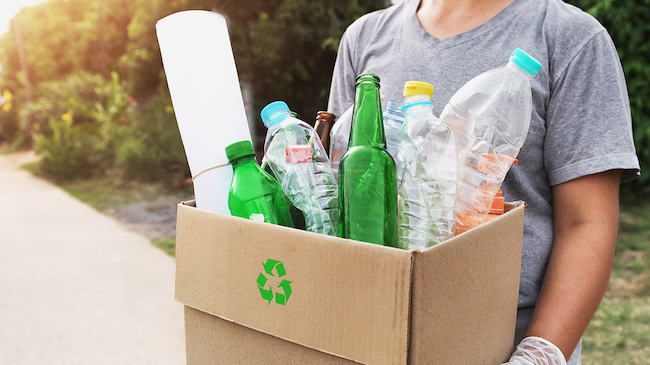Managing used plastic as a valuable resource provides a sound business case for scaling up recycling and other plastic circularity efforts, while promoting sustainable economic development, according to IFC – World Bank study.
The joint report finds that only 33 per cent of the total 3.9 million tons of the commonly used plastics disposed per year in Vietnam are recovered and recycled.
It estimates that 75 per cent of the material value of the plastics – equivalent to $2.2 billion to $2.9 billion per year is lost to the economy.
Globally, up to 50 per cent of marine plastic debris is contributed by single-use or short-use consumer packaging. The Covid-19 pandemic has exacerbated the situation due to increased consumption of masks, sanitizer bottles, and packaging for online delivery.
Plastic pollution caused by environmental leakage to the marine environment is especially acute for Vietnam given its long coastline. In response, the national action plan for management of marine plastic litter by 2030 aims to reduce 75 percent of Vietnam’s marine plastic debris over the next ten years.
Carolyn Turk, World Bank country director for Vietnam, said that rapid urbanization and a rising middle class have significantly increased consumption of plastic products and packaging, making regional emerging markets including Vietnam a hot spot for plastics pollution.
However, investments in waste management infrastructure have not kept pace.
She stressed that the public and private sector need to work together to address this complex environmental, social, and economic problem and drive policies and investments that help unlock material value.

The private sector in Vietnam has also been actively engaged in line with ongoing initiatives.
In fact, public and private sector stakeholders in Vietnam are increasingly active in addressing plastic waste.
For example, besides National Action Plan for Management of Marine Plastic Litter by 2030, Vietnam approved the National Plastic Action Partnership (NPAP) and passed an update to the 2014 Law on Environmental Protection (LEP).
The private sector has also been actively engaged in line with ongoing initiatives such as the Public Private Collaboration (PPC) Vietnam, Packaging Recycling Organization Vietnam (PRO Vietnam).
Some members of PRO Vietnam such as Coca Cola, La Vie, Pepsico have replaced colored plastic bottles with transparent plastic ones, so that it can be easily recycled after use.
Furthermore, in 2020, Vietnam saw the first major green financing program launched by a local Vietnamese bank, VP Bank, with a credit line extended by the International Finance Corporation (IFC) for $212.5 million.
This program includes eight Green Asset categories, including the category “eco-friendly and/or circular economy adapted products, production, technologies.”
Dual benefits from plastic recycling
The World Bank Group study uses a plastic value chain approach to identify how key resins are produced, used, and managed in Vietnam while promoting increased waste segregation, collection and recycling to unlock additional material value.
“A circular economy is critical for Vietnam to meet low-carbon growth targets. Recycling plastics not only addresses plastics pollution, but it also avoids greenhouse gas emissions and saves valuable material resources,” said Kyle Kelhofer, IFC country manager for Vietnam, Cambodia, and Laos.
He emphasizes that improving the business case for plastic recycling will mobilize increased private sector investment to help address the scourge of plastics pollution, while supporting key sectors including tourism, shipping, and fisheries, which have been particularly impacted.
The study proposes both short and long-term solutions to enhance local demand for recycled plastics and scale up the domestic recycling industry by strengthening the enabling environment for private sector investment.
For example, it recommends improvement in waste management capacity, setting “recycled content targets” across major end-use applications, and mandating “design for recycling” standards for plastics, especially for packaging, among others.